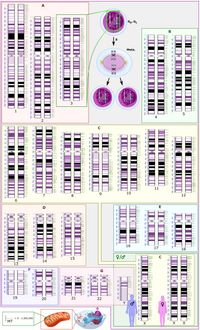
Photo from wikipedia
BackgroundSmall insertions and deletions (indels) have a significant influence in human disease and, in terms of frequency, they are second only to single nucleotide variants as pathogenic mutations. As the… Click to show full abstract
BackgroundSmall insertions and deletions (indels) have a significant influence in human disease and, in terms of frequency, they are second only to single nucleotide variants as pathogenic mutations. As the majority of mutations associated with complex traits are located outside the exome, it is crucial to investigate the potential pathogenic impact of indels in non-coding regions of the human genome.ResultsWe present FATHMM-indel, an integrative approach to predict the functional effect, pathogenic or neutral, of indels in non-coding regions of the human genome. Our method exploits various genomic annotations in addition to sequence data. When validated on benchmark data, FATHMM-indel significantly outperforms CADD and GAVIN, state of the art models in assessing the pathogenic impact of non-coding variants. FATHMM-indel is available via a web server at indels.biocompute.org.uk.ConclusionsFATHMM-indel can accurately predict the functional impact and prioritise small indels throughout the whole non-coding genome.
Journal Title: BMC Bioinformatics
Year Published: 2017
Link to full text (if available)
Share on Social Media: Sign Up to like & get
recommendations!